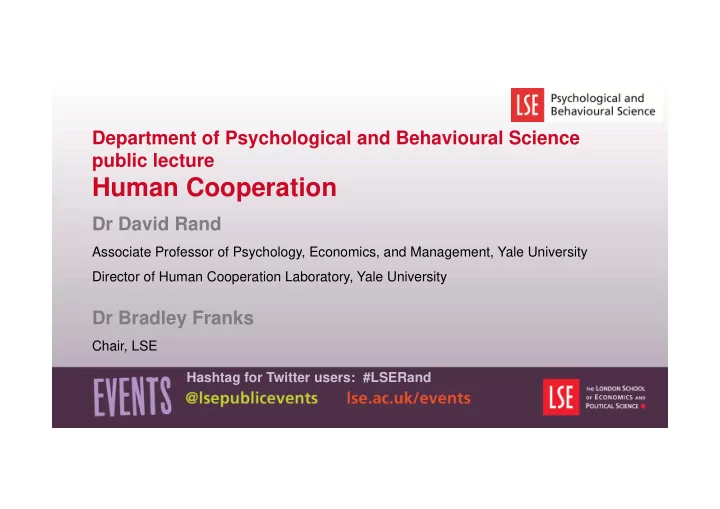

Department of Psychological and Behavioural Science public lecture Human Cooperation Dr David Rand Associate Professor of Psychology, Economics, and Management, Yale University Director of Human Cooperation Laboratory, Yale University Dr Bradley Franks Chair, LSE Hashtag for Twitter users: #LSERand
Human cooperation David G. Rand Associate professor of Psychology, Economics, and Management, Yale University London School of Economics, December 8 2016
Cooperation is essential
…but cooperation is a challenge
Why do people cooperate?
Cooperation pays off (in the long run)
“ Strategic ” cooperation Review: Dal Bo & Frechette 2016 JEL
“ Strategic ” cooperation Review: Nowak & Sigmund 2005 Nature
Review: Perc & Szolnoki 2010 Biosystems
Review: Perc & Szolnoki 2010 Biosystems
Ra N=430 Mturkers Rand et al 2011 PNAS
Milinski et al 2002 Nature, Rand et al 2009 Science
Erez Yoeli N=1408 CA residents Yoeli Hoffman Rand Nowak 2013 PNAS
$25 incentive had no sig effect Observability 7x more effective
$25 incentive had no sig effect Observability 7x more effective
Pure Strategic Coordination: Social dilemma: Cooperation payoff- Not (objective) payoff- maximizing if other maximizing to also cooperative cooperate
What explains Pure cooperation?
Dual-process perspective Sloman 1996, Stanovich & West 1998 Kahneman 2003, Evans 2008 Deliberation vs Intuition
Rational self-control of greedy impulses? Intuitively cooperative, rationally selfish?
Social Heuristics Hypothesis Typically long-run optimal behavior Internalized as intuitive default “social heuristic” Deliberation can override in atypical situations Rand et al 2014 Nature Comm
Intuition = cooperation Deliberation = defection Bear Rand 2016 PNAS
Testable Predictions Pure cooperation: Deliberation undermines cooperation Strategic cooperation: Deliberation supports cooperation
Experimental evidence Random effects meta-analysis Pay $ cost to give $ benefit to other(s) → Pure : partner can’t respond → Strategic: partner can respond Intuition vs deliberation manipulated → Time pressure/delay, cognitive load, ego depletion, intuition induction 67 studies from 26 groups, total N=17,647 → No publication bias (Eggers or p -curve) Rand 2016
Experimental evidence Random effects meta-analysis Pure cooperation: 17.3% more cooperation when intuition is promoted relative to deliberation (ITT=13.5%) Strategic cooperation: No meaningful difference (1.0%) between intuition and deliberation, p =.76
Intuition = generalized response (less sensitive to incentives)
Intuitive cooperation in the field Artavia-Mora et al. 2016 EER
Intuitive cooperation in the field Artavia-Mora et al. 2016 EER
Intuitive cooperation in the field
Intuitive heroism? Rand Epstein 2014 PLoS ONE
Intuitive heroism? 51 hero statements rated by 312 Ss
Intuitive heroism? 51 hero statements rated by 312 Ss ‘‘I’m thankful I was able to act and not think about it” “I just did what I felt like I needed to do.” Same relationship among Heroes estimated to have had at least 1 minute to act
Good institutions Cooperation pays off Cooperation internalized
Building cooperative cultures Stage 1: 3-player 10 round Public Goods Game → 140 unit endowment, contributions x1.2 Manipulate institutional quality: Stage 2: Split money with novel recipient (Dictator Game) N=516 Mturkers Stagnaro Arechar Rand 2016 SSRN
Building cooperative cultures
Signaling trustworthiness Intuition → Insensitive to strategic situation Jillian Jordan “Uncalculating” cooperation in situation A → Likely to cooperate in situation B Decision process gives information above and beyond actual choice Pizarro et al 2003, Critcher et al 2013 Uncalculating cooperation used to signal trustworthiness Jordan et al 2016 PNAS
( c unknown)
Player B perceives decision process as signal N=361 N=365 p<.001 p=.08 p<.001 p<.001 Interaction: p<.001 Interaction: p<.001
Decision process is signal of Player A trustworthiness N=595 N=140 N=624 N=113 p<.001 p=.718 p=.021 p=.486 Interaction: p=.031 Interaction: p=.019 [Controlling for reading speed]
Player A uses decision process as a signal N=735 N=737 p=.002 p=.014
Future consequences make cooperation pay off People cooperation even in 1-shot situations Intuition = easy/fast but inflexible, shaped by typical interactions For our subjects, intuition favors cooperation (pure and strategic) Deliberation undermines pure cooperation, but supports strategic cooperation Good institutions can create habits of prosociality Uncalculating cooperation is not only about cognitive ease – also reputation motives
Rand Nowak (2013) Trends in Cognitive Sciences 17, 413-435
Cooperators Paul Bloom Nicholas Christakis Anna Dreber Kyle Dillon Tony Evans Drew Fudenberg Josh Greene Moshe Hoffman Martin Nowak Alex Peysakhovich Erez Yoeli 1. Rand et al. (2011) Dynamic networks promote cooperation in experiments with humans. PNAS. 2. Rand et al. (2012) Spontaneous giving and calculated greed. Nature . 3. Rand Nowak (2013) Human cooperation. TiCS . 4. Yoeli et al. (2013) Powering up with indirect reciprocity in a large-scale field experiment. PNAS 5. Rand et al. (2014) Social heuristics shape intuitive cooperation. Nature Comm. 6. Rand Epstein (2014) Risking your life without a second though. PLoS ONE. 7. Bear Rand (2016 ) Intuition, deliberation, and the evolution of cooperation. PNAS. 8. Rand (2016) Cooperation, fast and slow: Meta-analytic evidence for social heuristics & self-interested deliberation. Psychological Science . 9. Stagnaro et al (2016) From good institutions to good norms. SSRN working paper. 10. Jordan et al (2016) Uncalculating cooperation is used to signal trustworthiness. PNAS.
Discussed during question period
Cooperation versus altruism Cooperation: possibility for mutual benefit → Pays off in repeated interactions Altruism (e.g. unilateral cash transfers) → Only pays off if required by social norms
Intuitive altruism? Prediction: altruism typically advantageous (and therefore intuitive) only to people for whom social norms require altruistic behavior → Women expected to be communal, men agentic; women punished if insufficiently communal Eagley, 1987; Heilman & Okimoto, 2007 Meta-analysis of 22 studies (N=4,366) → Dictator game: zero -sum unilateral $ transfer → Manipulating cognitive processing → 13 new studies, 9 previously published Rand et al 2016 JEP:General
Department of Psychological and Behavioural Science public lecture Human Cooperation Dr David Rand Associate Professor of Psychology, Economics, and Management, Yale University Director of Human Cooperation Laboratory, Yale University Dr Bradley Franks Chair, LSE Hashtag for Twitter users: #LSERand
Recommend
More recommend